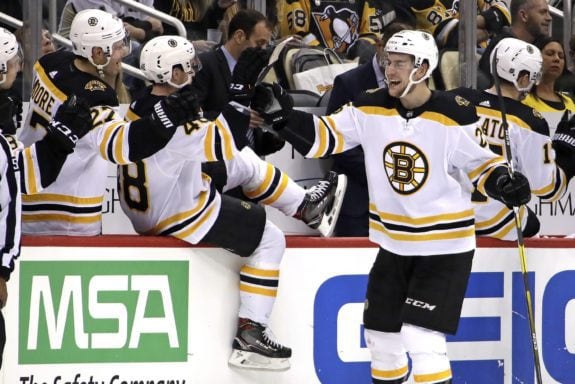In the last five seasons, Brandon Carlo has become an indispensable part of the Boston Bruins’ blue line. The 6-foot-5, 24-year-old, right-shot defenseman has a very quiet, steady style of play. While he doesn’t get as much attention as teammate Charlie McAvoy or former linemates Zdeno Chara and Torey Krug, he plays an essential role on the team.
These most recent playoffs saw the loss of Carlo in Game 3 of their second-round matchup against the New York Islanders. In his absence, the Bruins’ lack of depth was very visible, as well as just how important of a player he is, as they didn’t win a game without him in the 2021 playoffs (from “Loss of Brandon Carlo the turning point for Bruins,” Boston Herald, June 13, 2021). He is essential on the penalty kill, which was atrocious throughout the round but particularly in Game 5.
McAvoy can apply the offensive pressure, but Carlo is the one that holds down the Bruins’ own end. While the two rarely play together, both are essential players because the team is not the same without either. While they were drafted a year apart, they came into the league around the same time and were restricted free agents in 2019 — they signed bridge deals a few weeks apart.

Now that Carlo has reached the end of his two-year, $5.7 million deal, he’s still a restricted free agent since he hasn’t reached the age of 27 or spent seven years in the league. This means that he can sign with other teams, but the Bruins still control his rights, and another team would have to make an offer sheet but will lose draft picks if it actually goes through, which is a rarity.
Unlike 2019 when his entry-level deal came to an end, Carlo has arbitration rights this time around for contract discussions. Assuming the Bruins make him a qualifying offer to hold onto his rights, which they’d be foolish not to, if he and the team can’t come to an agreement on a contract, the decision can go to an independent arbitrator. Most times, deals get figured out before an actual arbitration date. To start talking about what his next contract may look like, let’s first look back at his career so far in Boston.
Quiet Success Story
Carlo is one of the lone bright spots for the Bruins’ infamous 2015 Entry Draft, where he was a second-round pick at 37th overall. He made his NHL debut at the start of the 2016-17 season, playing all 82 games that season. He scored his first NHL goal on Oct. 17, 2016, as a 19-year-old.
Carlo spent a good portion of his first season paired with captain Zdeno Chara and obviously learned tremendously from a player of his caliber, as he finished with 6 goals and 16 points in 82 games. He was a plus-nine and averaged around 20 minutes of ice time a night as well.
His first season remains his highest goal-scoring season, in part because he was playing with a shutdown guy like Chara and had more freedom to join the offensive rush, but he had his most points in the 2019-20 season when he had 19 points in 67 games. He has been a positive player his whole career, finishing a career-high plus-22 in 2018-19.
While he doesn’t necessarily have the same scoring prowess as the elite defensemen in this league that would grab him a major contract, his reliability and adaptability have become hallmarks of his young career. He’s played with both a shutdown guy like Chara and offensive-minded puck-movers like Krug. This past season, due to injuries and a young, inexperienced blue line, he had a rotating cast of teammates playing with him on the second pairing. Even with the constant changes, he still played his shutdown game and had timely points.
In five seasons, Carlo has arguably become one of the best penalty-killers and shutdown defensemen in the league. In an age where the value of defensemen has been increasingly placed on talented, small puck movers, the gentle giant has shown just how much value a great shutdown defenseman can bring to a team.
Injury Concerns Could Come Into Play
There is no doubt that the Bruins should make a qualifying offer to Carlo and should do everything in their power to sign him to a contract that works well for the team and does him justice as an essential player to the lineup. The one hiccup when considering his next contract is his injury history, more specifically, his concussion history.
Carlo has sustained four concussions since 2017 — three of them in a 16-month span and two in three months this past season. Between a concussion and an oblique injury, he only played 27 of 56 games in the 2020-21 season.
While one might think there are some concerns with his long-term health after that many concussions in a fairly short time frame, Carlo doesn’t appear to see it that way. He had the following to say during the final media availability of the season:
“No, not at this point, not at all. I think this year was obviously a struggle through these injuries. It’s no fun, but I’m not going to sit here and get discouraged or think that my career is heading down a wrong path because of a couple concussions. I hope this is the last one of my career and hopefully I can play as long as possible, but for how i’ve recovered from these, I don’t feel like there’s any issue there.”
-Ty Anderson
In addition to four concussions and an oblique injury this season, he was unavailable for the 2018 playoffs after suffering an ankle injury that required surgery and several months to recover. His injuries also usually come around the playoffs, so he hasn’t missed a ton of games necessarily, but he’s missed essential ones. This is where it becomes a cause for concern when debating how much term the Bruins should devote to him during upcoming contract negotiations.
What Should the Contract Be?
Carlo’s two-year bridge contract made a lot of sense when he signed it in 2019. It gave him a chance to continue to prove himself, and at the end of two years, the Bruins still get to hold his rights and maintain his restricted free agent status. It also was structured in a favorable way for him, as the final year of the deal had a base salary of $3.5 million, meaning that is what the team has to give him in a qualifying offer.
A three to four-year contract with an average annual value of $3.5 million wouldn’t be a bad deal. It gives a fair amount of term to an essential guy to this team but doesn’t keep them on the hook for too long if injuries do continue to plague him going forward.

McAvoy, the No. 1 defenseman on the Bruins, has one more year making $4.9 million, and based on the construction of his deal, he’ll be looking at a qualifying offer of $7.3 million. Last year, Matt Grzelcyk signed a great four-year deal with an AAV of $3,687,500. Taking that into consideration, it wouldn’t be a surprise to see the deal for Carlo have a higher value than $3.5 million since while he isn’t on the same elite level status as McAvoy, I would say he’s more valuable to the team than Grzelcyk.
Ultimately, I believe that a four-year deal worth somewhere in the $16 to 18 million range is where this will end up. It would give him an AAV of $4.0 to $4.5 million. He is the second-most valued defenseman on this team, and this contract would reflect that. Four years would give the Bruins a solid commitment to Carlo without devoting too much in case injuries become an issue. It would also be favorable for him as he would be 28 at the end of the contract and could find value if he wishes to test unrestricted free agency.
At the end of the day, the Bruins should do their best to avoid an arbitration hearing with Carlo. He has demonstrated some of the strongest leadership skills and qualities of the young crop of players on the roster. He’s already worn the “A” on a temporary basis and could have the potential to be the next captain whenever Patrice Bergeron retires. Management does not want to sour relations with a guy like that.
Those are my thoughts on what the next contract should be for four years, $16 to 18 million. What do you think? Agree? Disagree? Tell us in the comments below and stay tuned for more coverage on The Hockey Writers as the start of free agency draws closer.